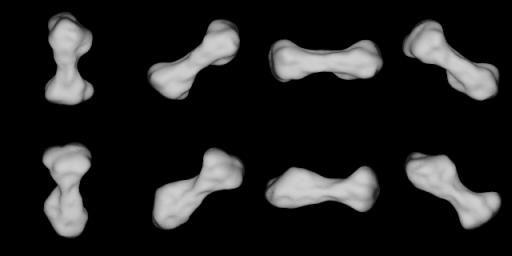
|
Radar Model of Asteroid 216 Kleopatra
- Click the image above for a larger view
- Full-Res JPEG (640 x 320) (11.6 kB)
- Full-Res TIFF (640 x 320) (41.4 kB)
Caption:
These images show several views from a radar-based computer model of asteroid 216 Kleopatra. The object, located in the main asteroid belt between Mars and Jupiter, is about 217 kilometers (135 miles) long and about 94 kilometers (58 miles) wide, or about the size of New Jersey.
This dog bone-shaped asteroid is an apparent leftover from an ancient, violent cosmic collision. Kleopatra is one of several dozen asteroids whose coloring suggests they contain metal.
A team of astronomers observing Kleopatra used the 305-meter (1,000-foot) telescope of the Arecibo Observatory in Puerto Rico to bounce encoded radio signals off Kleopatra. Using sophisticated computer analysis techniques, they decoded the echoes, transformed them into images, and assembled a computer model of the asteroid's shape.
The images were obtained when Kleopatra was about 171 million kilometers (106 million miles) from Earth. This model is accurate to within about 15 kilometers (9 miles).
Background Info:
The Arecibo Observatory is part of the National Astronomy and Ionosphere Center, operated by Cornell University, Ithaca, N.Y., for the National Science Foundation. The Kleopatra radar observations were supported by NASA's Office of Space Science, Washington, DC. JPL is managed for NASA by the California Institute of Technology in Pasadena.
Cataloging Keywords:
| Name | Value | Additional Values |
|---|---|---|
| Target | 216 Kleopatra | |
| System | Main Belt | |
| Target Type | Asteroid | |
| Mission | National Astronomy and Ionosphere Center (NAIC) | |
| Instrument Host | Arecibo Observatory | |
| Host Type | Ground-Based Observatory | |
| Instrument | Radio Telescope | Arecibo Radar |
| Detector | ||
| Extra Keywords | Collision, Radar, Radio | |
| Acquisition Date | ||
| Release Date | 2000-05-04 | |
| Date in Caption | ||
| Image Credit | NASA/JPL | |
| Source | photojournal.jpl.nasa.gov/catalog/PIA02454 | |
| Identifier | PIA02454 | |
